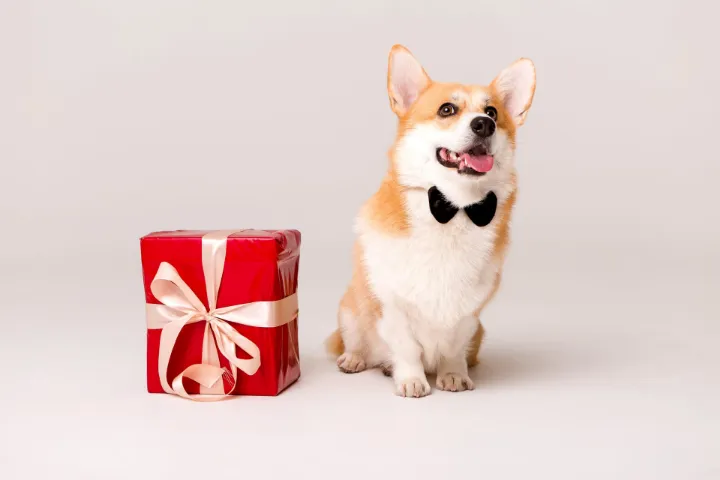No products in the cart.
Blog
Perfect Present Pet: A Comprehensive Guide On How To Choose One
Are you looking for the perfect pet that will make a heart-warming and thoughtful gift? Then you’ve come to the right place! Choosing a pet can be an intimidating process, but our comprehensive guide will help take away all of the guesswork. We will provide insights into factors including animal needs, care requirements, costs associated with having a pet, recommended breeds, and more.
A present pet – whether you’re deciding on getting your loved one their first furbaby or searching for an ideal companion they can bond with for years to come—we’ve got everything covered so that you can choose the furry friend best suited for them!
How a present pet can be a perfect idea for any celebrating occasions

Giving a pet as a present can make for a truly unforgettable gift, suitable for a variety of occasions. Birthdays, anniversaries, graduations, or even ‘just because’ — a new pet can bring joy, companionship, and love into someone’s life.
For instance, consider a young child celebrating a milestone birthday. The introduction of a pet could help teach them responsibility, empathy, and provide them with a loyal companion throughout their formative years. Or maybe it’s an anniversary, where a couple decides to bring a new pet into their home, symbolizing their commitment to nurturing and caring for a life together.
However, it’s important to remember that a pet isn’t just a gift—it’s a commitment to a living being that will rely on its owner for its well being. The recipient should be ready and willing to provide a loving and caring environment for their new companion. The idea of presenting a pet as a gift should not be taken lightly, but when done with consideration and thought, it can make any celebration extra special.
How to choose a perfect present pet

Choosing the perfect present pet involves careful consideration and understanding of several key factors to ensure a happy and healthy environment for both the pet and its future owner. Here are some crucial aspects to think about:
Identify the recipient’s lifestyle – think about what kind of pet would best fit into their home and schedule
A crucial determinant in choosing the perfect present pet depends on the recipient’s lifestyle. It’s essential to consider the nature of their home environment, their daily schedule, and the level of commitment they can provide.
If the recipient lives in a small apartment or a home without a yard, smaller pets such as cats, small dog breeds, or even fish and birds might be a better fit. These kinds of pets require less space but can still bring joy and companionship. On the other hand, if the recipient has a large backyard and enjoys staying active, a larger dog breed could be a great fit, as they’ll have ample room to play and exercise.
The recipient’s schedule also plays a significant role in pet selection. For those with a busy lifestyle or often away from home, consider pets that require less attention such as fish, reptiles or small mammals like hamsters or guinea pigs. However, if they are home most of the day and can provide lots of attention, dogs or cats would make wonderful companions.
Always remember, a pet is not just a gift; it’s a long-term commitment. Therefore, ensuring the pet can adapt to the recipient’s lifestyle will set the stage for a happy and lasting companionship.
Consider the cost of owning a pet – factor in vet visits, food, toys, etc.

Pet ownership comes with ongoing expenses that are often overlooked. Firstly, there is the cost of food, which varies depending on the size of the pet. Larger pets, like dogs, naturally require more food than smaller pets like cats or birds, leading to higher expenses.
To uphold their health, pets also require regular vet check-ups. These visits, along with any necessary vaccinations or treatments, can accumulate substantial costs over time. It’s additionally critical to factor in unforeseen medical expenses, as pets, like their human counterparts, can fall sick or get injured.
Pets also require toys and entertainment for their mental stimulation and physical exercise. Depending on the pet, these items can range from simple balls and chew toys to more expensive items like cat trees or aquarium setups.
Finally, if the potential owner travels frequently, they might also need to consider the costs of pet care or pet boarding services. All these aspects should be taken into account when deciding on a present pet, ensuring that the recipient can comfortably cover these costs to provide a nurturing environment for their new companion.
Do your research to pick the right breed or animal type for your recipient

Understanding the individual characteristics of different breeds or types of animals is pivotal in the pet selection process. The types of breeds and species vary vastly in their nature, size, lifespan, and care needs. For example, within the dog species itself, a Siberian Husky and a Pomeranian have completely different care needs and temperaments. One might be okay with a couple of walks a day, while the other might need more vigorous exercise.
Researching about the breed or type of your potential present pet allows you to make an informed decision that aligns with the recipient’s lifestyle and preferences. Online platforms, books, animal shelters, and even pet stores can offer valuable information about different breeds or animal types.
It’s also important to remember that every pet, irrespective of their breed or species, has its unique personality. Spending time with the pet, when possible, before gifting can provide insights into the pet’s demeanor, helping ensure it’s a good fit for the recipient.
In essence, thorough research is the key to finding the perfect pet. It is a significant step that helps ensure that the present pet will seamlessly integrate into the recipient’s life, and will bring them joy and companionship for years to come.
Choose a reputable breeder/pet store that has healthy and well-cared for animals

Choosing a reputable breeder or pet store is an essential step in the process of gifting a pet. This ensures the present pet is not only healthy but has been raised in a loving and nurturing environment, which can significantly affect their demeanor and overall health.
Reputable breeders place a high importance on the health and welfare of their animals. They are knowledgeable about the breed they specialize in, conduct health screenings, and provide detailed information about the pet’s lineage, genetic history, and temperament. They also ensure their animals are appropriately socialized, which is crucial for their development and adjustment to new environments. When dealing with reputable breeders, you can expect honesty and transparency about the potential challenges or health issues related to the breed.
Pet stores should also prioritize the health and wellbeing of their animals. Look for stores that have clean, spacious, and comfortable enclosures, and staff who are knowledgeable and caring. An ethical pet store will be willing to provide information about where the animals come from and their health history.
In both scenarios, it’s a good sign if they ask you questions about your recipient’s lifestyle or home environment. This shows they are interested in ensuring a good match between the pet and the new owner.
Avoid breeders or pet stores that have too many different breeds, seem primarily focused on profit, or where animals appear unhealthy or poorly cared for. Such conditions could indicate unethical practices or a lack of proper care.
Choosing a reputable breeder or pet store is an integral part of ensuring that your present pet is healthy, well-adjusted, and ready to bring joy to their new home.
Factor in any allergies your recipient may have – ensure the pet won’t trigger any reactions

Considering potential allergies is a crucial aspect when selecting a pet as a gift. Allergies to pets, particularly cats and dogs, are relatively common and can cause a range of symptoms – from mild discomfort like sneezing or itching to severe reactions like asthma attacks. Hence, it’s imperative to ensure that the recipient is not allergic to the type of pet you’re considering.
If the recipient suffers from pet allergies, options are not entirely ruled out. Certain breeds of cats and dogs are known to be hypoallergenic, meaning they are less likely to trigger allergic reactions. Breeds like the Russian Blue cat or the Bichon Frise dog are known to produce fewer allergens, making them suitable choices for individuals with mild pet allergies.
Birds, fish, reptiles, and amphibians can also be good alternatives, as these pets are less likely to trigger allergic reactions compared to furry pets. However, it’s important to remember that no pet is completely allergen-free, and individual reactions to different animals can vary greatly.
Before deciding on a pet, it may be beneficial for the recipient to spend time with the animal first to gauge any allergic reactions. Alternatively, an allergy test can provide insights into what kinds of pets are safe for them. The goal is to ensure that the present pet becomes a source of joy for your recipient, not discomfort or health risks.
Make sure you know how to properly care for the pet before taking it home (diet, vaccinations, etc.)

Knowing how to properly care for your present pet before bringing it home is vital. This involves understanding the pet’s diet, vaccination requirements, and other care needs.
Diet is a key aspect of pet care. Different animals have varied dietary needs based on their breed, age, size, and health condition. For instance, puppies and kittens require diets rich in protein and certain nutrients for their growth and development. Some pets might need specific diets due to health issues, such as allergies or digestive problems. Pet food labels can provide comprehensive information about the ingredients and nutritional content, but it’s also wise to consult with a vet or pet nutrition expert for personalized advice.
Vaccinations are another essential aspect of pet care. Vaccinating your pet protects them from various diseases, some of which can be life-threatening. The type and frequency of vaccinations depend on your pet’s species, age, lifestyle, and the prevalence of certain diseases in your location. Common vaccinations for dogs include rabies, distemper, parvovirus, and hepatitis, while cats are generally vaccinated against feline distemper, calicivirus, and rhinotracheitis.
In addition to diet and vaccinations, other care needs might include grooming, exercise, socialization, and mental stimulation. The requirements for these will vary based on the pet’s breed, age, and personality.
Understanding these care needs before bringing your present pet home ensures you are prepared and can provide the best possible environment for your new companion. This not only helps the pet adjust to their new home but also fosters a happy and healthy relationship between the pet and its new owner.
Consider the right types of pet to present

When selecting a pet as a gift, it’s important to consider the recipient’s lifestyle and preferences. Some pets require more attention or care than others, making them less suitable for people with busy schedules.
Cats are usually well-suited for individuals looking for independent pets that don’t need as much attention. They can be left alone during the day and often sleep most of the time. In addition, cats require minimal exercise compared to other animals, although they still benefit from routine play time.
Smaller pets like hamsters, gerbils, and guinea pigs are other good options for busy individuals. They have short lifespans compared to cats or dogs, but they still provide companionship and require relatively low maintenance in terms of diet and space.
Larger pets such as horses are also suitable gifts depending on the recipient’s lifestyle and living situation. Horses require a great deal of care and attention, including regular grooming, exercise, and veterinary visits. They also need plenty of space to graze or run around, making them best suited for rural or suburban areas with large yards.
No matter the pet you choose as a gift, the important thing is that it’s something both you and the recipient will enjoy. Doing your research and speaking to experts can help you make the best decision for all parties involved. With a little bit of effort, you can find the perfect present pet that will bring lots of joy and happiness!
Factor in what kind of accessories attached

It’s also important to think about what kind of accessories might be needed for the pet- a bed or crate for sleeping in.
When selecting a pet as a present, it’s also important to remember to factor in all the necessary accessories needed for its care and comfort. This includes items such as bedding, food dishes, toys, grooming tools, and more. If you’re gifting a cat or other small pet, a bed or crate is essential for sleeping safely and securely. For larger animals, such as horses, stalls and feed bins may also be required. Accessories are not only necessary for the pet’s comfort but also for its safety and health. Investing in quality items ensures that your present pet receives the best care and enjoys a long, happy life!
[amazon bestseller=”Cannie Bed”]No matter what kind of pet you choose – whether it’s a small hamster or a large horse – make sure it’s something both you and your recipient will enjoy. With the right research, preparation, and accessories, you can find the perfect present pet that will bring years of joy and companionship.
Finally, don’t forget to provide plenty of love! A pet brought into someone’s life is a special gift that requires scare and dedication, but the rewards are immeasurable.
Choosing the right present pet can be a complex decision, but with the right research and information, you can find the perfect companion for your recipient that is sure to bring joy and happiness! With these tips in mind, selecting an appropriate pet as a birthday gift will be an enjoyable process that results in a meaningful and lasting friendship.
What else can make a perfect present pet combo

Presenting a gift pet with some additional thoughtful items can enhance the gifting experience and provide the new pet owner with some essentials to get started.
Matching Outfits
A matching outfit is a fun and adorable addition to your present pet gift. This could be a shirt, a scarf, or a hat that your recipient can wear, coordinated with a pet version for the new furry friend. Ensure the outfit is comfortable, safe, and appropriate for the breed and size. This creative gift idea not only strengthens the bond between the pet and its owner but also makes for great photos.
[amazon bestseller=”Pet Hats” ]Comfortable Pet Bed
Providing a new, comfortable bed can make the transition easier for the pet and shows your thoughtfulness as a gift-giver. The bed’s size, material, and elevation should be suitable for the specific pet. For instance, older pets or pets with joint issues may appreciate a heated or orthopedic bed. A comfy pet bed will provide a safe, comforting space for the pet in its new home.
[amazon bestseller=”Pet Bed” ]Engaging Toys
Pets, especially young ones, need stimulation and toys are a great source of entertainment and learning. Depending on the pet, these could be chew toys, balls, puzzle toys, or interactive toys. Toys that encourage physical activity and mental stimulation can contribute to the pet’s overall health and happiness.
[amazon bestseller=”Chew Toys For Pet” ]Nutritious Food and Treats
Including a supply of nutritious food and treats specific to the pet type and breed can be a thoughtful addition to your gift. This not only helps the new pet owner get started with proper feeding but also ensures that the pet’s dietary needs are met. You could also consider including a pet cookbook if the recipient enjoys making homemade pet food or treats.
[amazon bestseller=”Dog Treats” ]Pet Care Essentials
Lastly, gifting pet care essentials such as grooming tools, a leash and collar, feeding bowls, or a litter box (for cats) can be very helpful for first-time pet owners. These necessary items ease the transition of bringing a new pet home and set the new owner on the right path to proper pet care. Remember to choose items that are safe and appropriate for the specific pet.
[amazon bestseller=”Pet Grooming Tools” ]Caring tips for your present pet to the recipient

Regular Vet Check-ups
Regular veterinary check-ups are vital to ensure the health and wellbeing of your present pet. These check-ups aid in early detection and treatment of potential health issues. They also provide an opportunity for the pet owner to ask questions and seek advice about pet care. Ensure the recipient knows the importance of setting up a regular vet schedule for their new pet.
Proper Training
Training is a crucial aspect of pet care. It helps in establishing good behavior and preventing potential issues. The pet owner should be encouraged to invest time in training their new pet right from the start – whether it’s basic commands for a dog or litter training for a cat. If the pet is a puppy or a kitten, they might consider enrolling in a pet obedience class.
Socialization
Socialization is key in ensuring a pet is well-adjusted and comfortable in various environments. Early exposure to different people, pets, sights, and sounds can contribute to a pet’s confidence and overall demeanor. The recipient should be advised to gradually expose the pet to new experiences to ensure they grow up to be a well-rounded individual.
Adequate Exercise
Providing suitable and regular exercise is essential for the pet’s physical health and mental stimulation. The type and amount of exercise needed can depend on the pet’s breed, age, and health. Regular walks, playtime, or even participating in a pet sport can keep the pet active and happy.
Emotional Well-being
Lastly, catering to the emotional well-being of the pet is just as important as providing for their physical needs. Pets require love, attention, and companionship. Spending quality time, showing affection, and creating a loving environment are essential for the pet’s emotional health. The recipient should be reminded that a pet is not just a present, but a commitment of time, resources, and heart.
FAQs related to choosing a present pet

What factors should I consider when choosing a pet as a present?
Choosing a pet as a present involves careful consideration. You need to consider the recipient’s lifestyle, their home environment, and their ability and willingness to care for a pet. Additionally, the pet’s breed, size, lifespan, and care needs should be taken into account. It’s vital to ensure that the pet will be a good fit for the recipient’s life and that they are prepared for the responsibility.
Is it better to surprise someone with a pet as a present or involve them in the selection process?
While surprising someone with a pet might seem like a grand gesture, it’s generally best to involve them in the selection process. This ensures that the recipient is ready for the responsibility, and it allows them to choose a pet that fits their lifestyle, preferences, and needs.
Are certain types of pets more suitable as gifts than others?
The suitability of a pet as a gift depends largely on the recipient. Some pets require more care and attention than others. For example, dogs typically need more time and commitment than cats. Small animals like guinea pigs or fish can be a good choice for first-time pet owners or children, as they require less care compared to larger pets. It’s crucial to choose a pet that matches the recipient’s lifestyle and capabilities.
How can I ensure the recipient is ready for the responsibility of a pet?
Before giving a pet as a present, have a candid conversation with the recipient about the responsibilities of pet ownership. Make sure they’re aware of the time, money, and emotional investment involved. You could also consider gifting a pet care book or arranging a meeting with a vet or a pet care expert to provide them with professional advice.
What should I do if the recipient is not ready or willing to take care of the pet?
If the recipient is not ready or willing to take care of the pet, it’s important not to force the responsibility on them. Owning a pet is a long-term commitment and should not be taken lightly. Instead, consider other pet-related gifts, such as sponsoring a pet in their name at a local animal shelter or giving a virtual pet.
Conclusion
Choosing the perfect present pet requires a lot of thoughtful consideration. It’s not just about picking the cutest puppy or the fluffiest kitten. As a giver, it’s essential to ensure that the recipient is ready and capable of handling the responsibilities that come with pet ownership. The bond between a pet and its owner is special and enduring, and making the right choice can lead to a lifetime of love, companionship, and unforgettable memories. The right pet can indeed be the perfect present, but it’s crucial to remember that this present comes with a commitment that lasts the pet’s entire lifetime.

